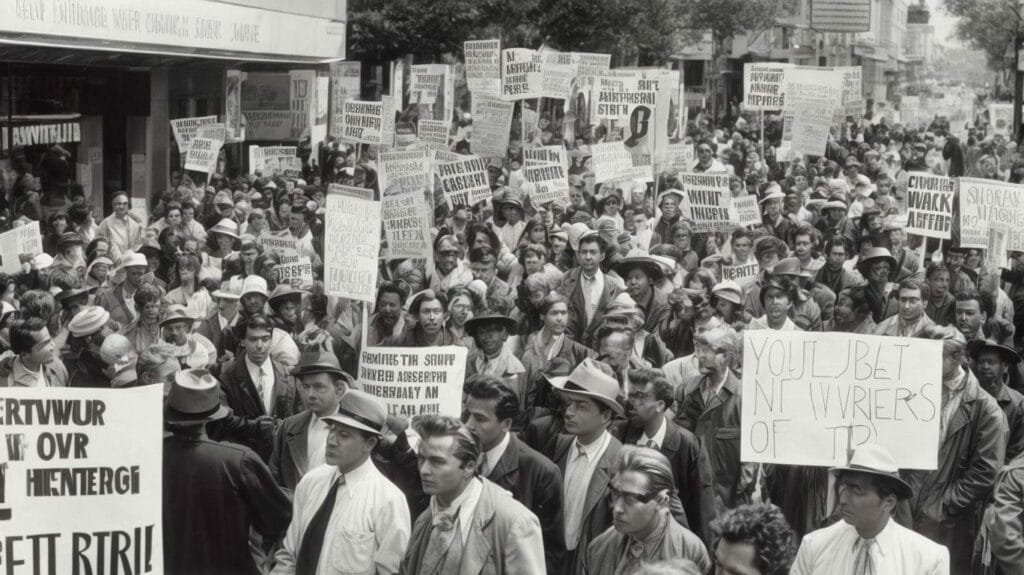The Hollywood Writers Strike is a significant event that has had a profound impact on the entertainment industry. It is essential to understand what the strike entails, the demands of the striking writers, the history of previous strikes, the effects of the strike, key players and stakeholders involved, media coverage and public opinion, and the resolution and aftermath of the strike.
The Hollywood Writers Strike refers to a collective work stoppage by writers in the entertainment industry, specifically the film and television sectors. Writers of the Writers Guild of America (WGA) participated in the strike to demand better working conditions, fair compensation, and improved writer rights.
The main demands of the striking writers typically revolve around fair compensation for their work, including issues such as residuals, healthcare, and working conditions. These demands address the power imbalance between writers and production companies, often resulting in writers receiving limited benefits and compensation compared to other industry professionals.
To understand the context of the Hollywood Writers Strike, it is crucial to examine the history of previous strikes. One notable example is the 2007-2008 Writers Guild of America Strike, which lasted for 100 days and had a significant impact on the television industry. Studying previous strikes provides insights into the patterns, strategies, and outcomes of these labor disputes.
The effects of the Hollywood Writers Strike are far-reaching and impact various aspects of the entertainment industry. It disrupts the production of television shows and films, leading to delays, postponements, and even cancellations of projects. The strike also has substantial economic consequences, resulting in financial losses for production companies, studios, and other industry stakeholders.
Key players and stakeholders in the Hollywood Writers Strike include the Writers Guild of America (WGA), which represents the striking writers and negotiates on their behalf. The Alliance of Motion Picture and Television Producers (AMPTP) represents the production companies and studios involved in the labor dispute. Actors, directors, and other industry professionals may show support or opposition to the strike, as they are affected by the consequences of the work stoppage.
Media coverage and public opinion are crucial in shaping the narrative surrounding the Hollywood Writers Strike. There is often support for the striking writers, with recognition of their rights and the importance of fair compensation for their creative work. However, there may also be criticisms and opposition to the strike, citing concerns about the economic impact, job losses, and the disruption of entertainment content.
Finally, the resolution and aftermath of the Hollywood Writers Strike involve negotiations between the Writers Guild of America and the Alliance of Motion Picture and Television Producers. Once an agreement is reached, it marks the end of the strike and the beginning of rebuilding the industry. The resolution may have long-term implications for writers, production companies, and the overall landscape of the entertainment industry.
Key takeaways:
- Hollywood Writers Strike impacts TV shows and film releases: The strike disrupts the production of television shows, resulting in delayed or canceled episodes. It also affects film production and release schedules, leading to postponed or reworked projects.
- The Writers Guild of America and producers clash over demands: The strike arises from disputes over payment, residuals, and healthcare benefits. The Writers Guild of America demands fair compensation and improved conditions, while producers aim to protect their profit margins.
- The strike’s aftermath prompts industry changes: Following negotiations between the parties, industry stakeholders must rebuild and address the strike’s consequences. The resolution may lead to significant changes in the entertainment industry and shape future labor negotiations.
What Is the Hollywood Writers Strike?
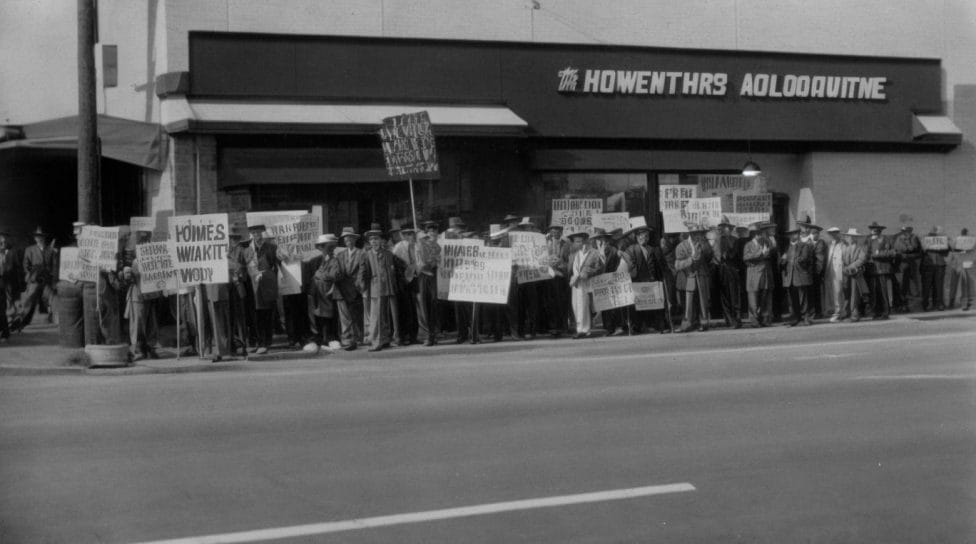
Photo Credits: Loststorystudios.Com by Thomas Williams
The Hollywood Writers Strike, the labor dispute between the Writers Guild of America (WGA) and the Alliance of Motion Picture and Television Producers (AMPTP), arises when writers halt their work on film and television projects. This strike emerges when the WGA and AMPTP fail to agree on compensation, working conditions, and creative rights. Consequently, TV shows and movies endure production delays or even face cancellation. Notably, past strikes in 1988 and 2007 caused significant disruptions within the entertainment industry, resulting in financial losses for writers and producers. Therefore, it is paramount that all parties involved engage in sincere negotiations to avert the adverse repercussions of a potential Hollywood Writers Strike.
What Are the Main Demands of the Striking Writers?
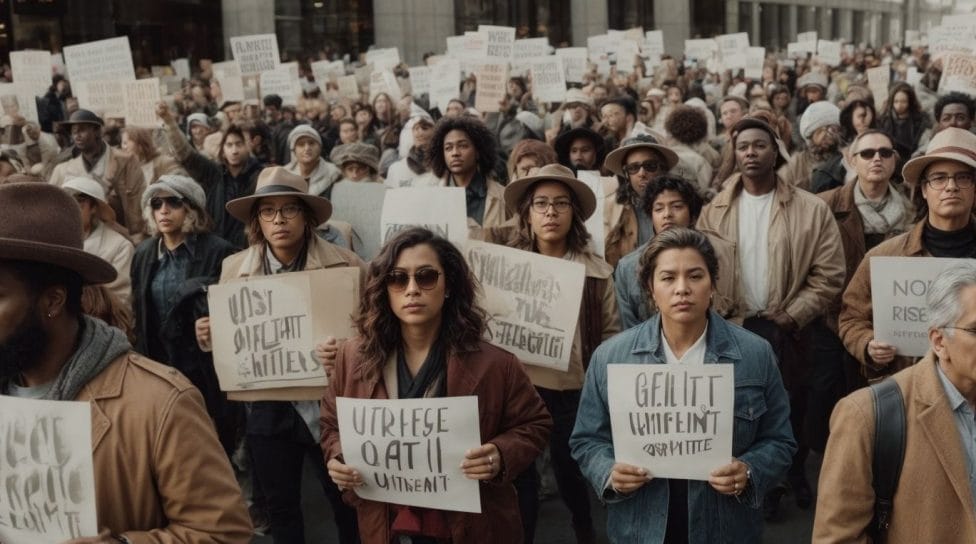
Photo Credits: Loststorystudios.Com by Arthur Torres
During the Hollywood writers’ strike, the main demands of the striking writers revolved around fair compensation and rights. What Are the Main Demands of the Striking Writers? They seek increased wages, better residuals, and improved healthcare and pension plans. The writers are pushing for better representation and inclusion of underrepresented voices in the industry. They advocate for equal opportunities for women, people of color, and LGBTQ+ community members. The striking writers aim to address longstanding issues in the entertainment industry and create a more equitable and inclusive environment for all writers.
History of Hollywood Writers Strikes
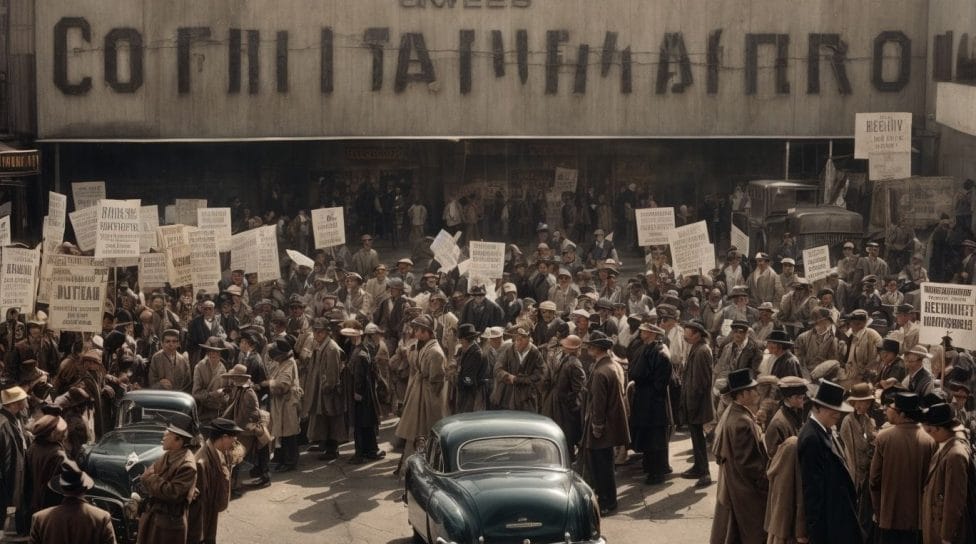
Photo Credits: Loststorystudios.Com by Anthony White
Unleashing the power of the pen, we dive into the captivating history of Hollywood writer’s strikes. Brace yourselves for a riveting journey through time as we explore notable events like the infamous 2007-2008 Writers Guild of America strike. We’ll also uncover the lingering impact of previous strikes, shedding light on how they have shaped the landscape of the entertainment industry. Get ready to witness the true power and influence of these resilient storytellers.
1. The 2007-2008 Writers Guild of America Strike
The Writers Guild of America Strike from 2007-2008 is a significant milestone in the entertainment industry’s history. Amid the rise of digital media, writers united to demand just compensation for their valuable contributions. Spanning a hundred days, this strike had a profound impact on both the television and film sectors, resulting in substantial losses for networks, production companies, and the writers themselves. Ultimately, negotiations between the Writers Guild of America and the Alliance of Motion Picture and Television Producers paved the way for a new agreement. This strike undeniably sheds light on the imperative to acknowledge and appropriately reward writers for the digital dissemination of their creative endeavors.
2. Previous Strikes and Their Impact
Previous strikes by Hollywood writers have had a significant impact on the industry. One notable strike was the 2007-2008 Writers Guild of America, which lasted for 100 days and had far-reaching consequences. It led to the delay or cancellation of various television shows and films, resulting in financial losses for entertainment companies. The strike also highlighted the power dynamics between writers and production companies, sparking discussions about fair compensation and better working conditions. While the strike eventually ended with negotiations and agreement, its aftermath involved efforts to rebuild the industry and consider the long-term implications.
Similarly, during the 1988 Writers Guild of America strike, writer and producer Glen Charles turned to book writing to keep himself creatively engaged. He wrote a novel titled “Dead in the Water,” which not only became a bestseller but also adapted into a successful film, proving that even in challenging times, writers can find alternative avenues for expression and success.
Effects of the Hollywood Writers Strike

Photo Credits: Loststorystudios.Com by Walter Davis
The Hollywood Writers Strike sent shockwaves through the industry, and its effects were far-reaching. Television shows and scripts were heavily impacted, causing delays and uncertainty for eager viewers. Film production and releases also took a hit, disrupting the entertainment calendar and leaving fans waiting for their favorite movies. The economic consequences and losses incurred due to the strike were significant, leaving both the industry and its workforce grappling with the aftermath. Let’s delve into the aftermath and explore the repercussions of this historical event.
1. Impact on Television Shows and Scripts
The Hollywood Writers Strike had a profound impact on television shows and scripts by halting the production of new episodes and delaying the release of upcoming seasons. Numerous popular shows were compelled to go on hiatus or reduce the length of their seasons. In addition, the strike disrupted the writing process, impeding writers from generating fresh scripts and storylines. Consequently, viewers faced a scarcity of new content and patiently waited for their favorite shows to resume. This strike shed light on the crucial role of writers in the entertainment industry and initiated discussions regarding fair compensation and working conditions for writers.
2. Impact on Film Production and Releases
The Hollywood Writers Strike had a significant impact on film production and releases. Here are some key effects:
- Delays: The strike caused significant disruptions in the development of scripts, leading to substantial delays in film production and the release of new movies.
- Script Revisions: To work around the strike, many films were forced to cope with incomplete scripts or employ non-union writers to make revisions and adjustments during the strike.
- Limited Releases: Due to the strike’s impact on script availability, studios were compelled to focus on releasing big-budget films. In contrast, smaller independent films encountered difficulties securing funding and distribution opportunities.
- Box Office: The strike adversely affected revenues, as audiences had fewer movie options. Some high-profile films faced production issues directly linked to the strike, further affecting their performance at the box office. Read more about the Hollywood Writers Strike.
To mitigate the potential impact of future strikes, industry stakeholders must prioritize fair negotiations to prevent disruptive incidents in film production. Additionally, exploring alternative revenue streams, such as streaming platforms, can offer a viable solution to mitigate the financial repercussions caused by strikes.
3. Economic Consequences and Losses
The Hollywood Writers Strike had significant economic consequences and losses for various stakeholders in the industry. Here are some key points to consider:
- Decreased revenue: The strike led to declining ticket sales and TV ratings, resulting in financial losses for production companies and studios.
- Job losses: Many industry professionals, such as actors, directors, and crew members, were out of work during the strike, leading to a significant impact on the economy.
- Delayed releases: The strike caused delays in the production and release of films and TV shows, resulting in missed box office opportunities and advertising revenue.
To recover from these economic consequences and losses and prevent future strikes, industry leaders and unions must engage in open dialogue, negotiate fair contracts, and find mutually beneficial solutions. Collaboration and compromise are key to avoiding economic consequences and ensuring the sustainability of the entertainment industry.
Key Players and Stakeholders in the Hollywood Writers Strike
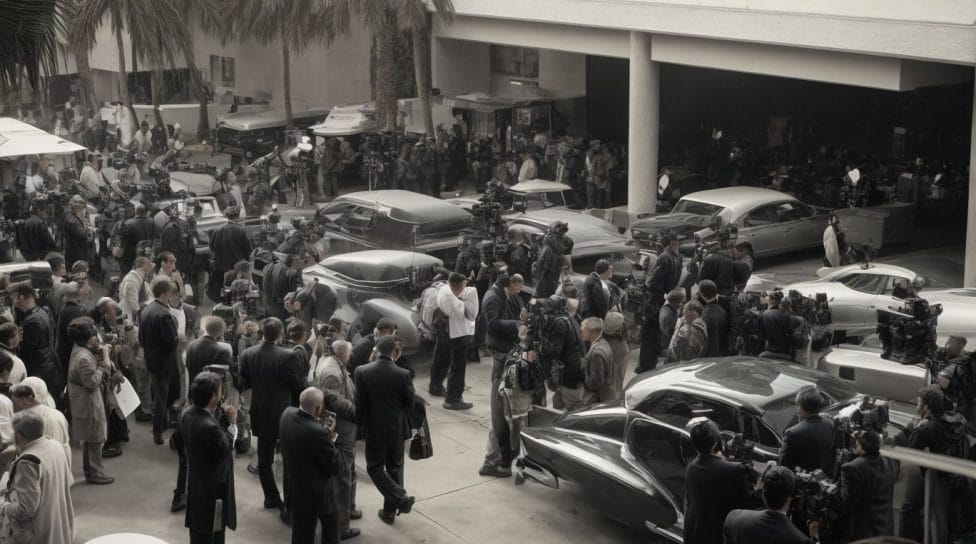
Photo Credits: Loststorystudios.Com by Gregory Mitchell
Amid the Hollywood Writers Strike, the key players and stakeholders come into sharp focus. We’ll dive into the intriguing sub-sections, such as the influential Writers Guild of America and the powerful Alliance of Motion Picture and Television Producers. But it doesn’t stop there, as we’ll also uncover the perspectives of actors, directors, and other industry professionals who play a vital role in this ongoing battle. Prepare to uncover the fascinating dynamics of this high-stakes Hollywood conflict.
1. Writers Guild of America
The Writers Guild of America (WGA) is a labor union representing writers in the entertainment industry. As a labor union, the Writers Guild of America (WGA) advocates for fair working conditions, wages, and benefits for their members. Key aspects of the Writers Guild of America (WGA) include:
- Collective bargaining: The Writers Guild of America (WGA) negotiates with studios and production companies on behalf of their members to establish contracts that protect their rights and ensure fair compensation.
- Professional development: The Writers Guild of America (WGA) union provides resources and support for writers to improve their skills and navigate the industry.
- Legal services: The Writers Guild of America (WGA) offers legal assistance to writers in matters related to their work, including contract disputes or copyright issues.
As a suggestion, writers who aspire to join the industry should consider becoming members of the Writers Guild of America (WGA) to gain access to these benefits and have their voices represented in negotiations.
2. Alliance of Motion Picture and Television Producers
The Alliance of Motion Picture and Television Producers (AMPTP) plays a crucial role in the Hollywood Writers Strike. As representative of major studios and production companies, the AMPTP negotiates with the Writers Guild of America (WGA) on behalf of these studios. Their main objective is to safeguard the studios’ interests during contract negotiations. Throughout the years, the AMPTP has been actively involved in resolving disputes regarding writers’ wages, healthcare benefits, and residuals. Given their significance, the involvement of the Alliance of Motion Picture and Television Producers (AMPTP) is essential in reaching a resolution to the strike and ensuring the uninterrupted continuation of film and television production. A notable incident relevant to this topic occurred when the AMPTP and the WGA reached a tentative agreement in 2008, effectively ending the strike and providing much-needed relief to writers, enabling them to resume their work.
3. Actors, Directors, and Other Industry Professionals
Actors, directors, and other industry professionals are crucial in the Hollywood writer’s strike. They often join the striking writers in solidarity and advocate for fair working conditions and compensation. Actors, directors, and other industry professionals may refuse to cross picket lines, leading to delayed or halted production. Directors and other industry professionals may show support by publicly expressing their solidarity. Other industry professionals, like producers and crew members, may also be affected by the strike as their jobs rely on the functioning of the entertainment industry. Their involvement, along with actors and directors, highlights the interconnectedness of different roles in the film and television industry. Fact: During the 2007-2008 Writers Guild of America strike, many actors, directors, and other industry professionals showed support by attending rallies and joining picket lines.
Media Coverage and Public Opinion of the Hollywood Writers Strike
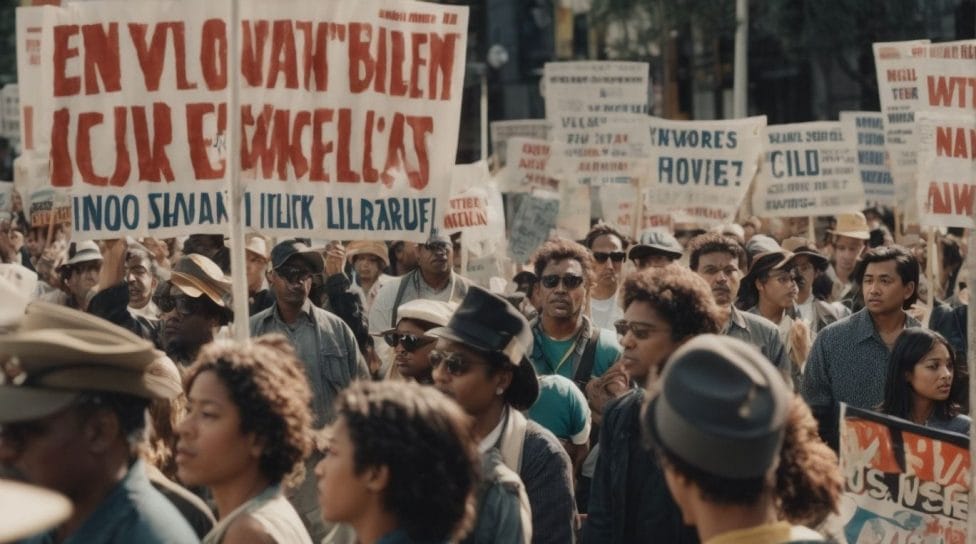
Photo Credits: Loststorystudios.Com by Tyler Wilson
Throughout the media landscape, the Hollywood Writers Strike has ignited a fiery public reaction. In this captivating section, we’ll delve into the fascinating world of media coverage and public opinion surrounding this historic event. Brace yourself as we explore two contrasting perspectives: the overwhelming support garnered by the striking writers and the intense criticisms and opposition they have faced. Prepare to be immersed in a whirlwind of viewpoints and controversies as we dissect this compelling chapter of Hollywood’s history.
1. Support for the Striking Writers
Support for the striking writers during the Hollywood Writers Strike was evident from various key players and stakeholders in the entertainment industry.
- 1. Writers Guild of America: The union representing the writers received overwhelming support from its members, who believed in fair compensation and rights for their creative work.
- 2. Actors, Directors, and Other Industry Professionals: Many actors and directors showed solidarity with the striking writers, refusing to work on projects that didn’t have a proper agreement with the writers’ union.
- 3. Public Opinion: The public, recognizing the importance of writers in creating quality content, supported the strike through social media campaigns, attending rallies, and boycotting shows or films that didn’t support the writers’ demands.
The support for the striking writers was evident from the Writers Guild of America, as the union representing the writers received overwhelming support from its members, who strongly believed in fair compensation and rights for their creative work. Additionally, many actors, directors, and other industry professionals showed solidarity with the striking writers, refusing to work on projects that didn’t have a proper agreement with the writers’ union. The public also played a crucial role in supporting the strike, recognizing the importance of writers in creating quality content. They expressed their support through social media campaigns, attending rallies, and boycotting shows or films that didn’t support the writers’ demands. Read more about the Hollywood Writers Strike.
2. Criticisms and Opposition to the Strike
- Criticisms and Opposition to the Strike: Critics argue that strikes can result in writers losing their jobs and income, especially if the strike continues for an extended period.
- Criticisms and Opposition to the Strike: Opponents claim that strikes disrupt the film and television industry, causing production delays and the release of new content.
- Criticisms and Opposition to the Strike: Some people feel frustrated when their favorite shows are put on hold due to the strike, leading to negative sentiments towards the striking writers.
- Criticisms and Opposition to the Strike: There are differing views within the industry, with some professionals believing that strikes are necessary for the protection and advancement of writers’ rights, while others argue that there are alternative methods of negotiation that can be pursued.
Resolution and Aftermath of the Hollywood Writers Strike
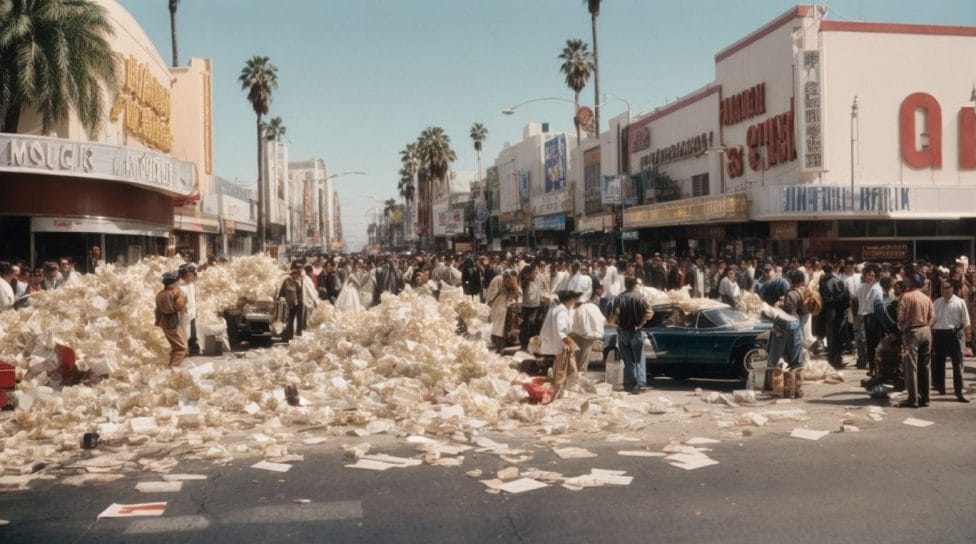
Photo Credits: Loststorystudios.Com by Jason Williams
After the intense Hollywood Writers Strike, the dust settles as we dive into the resolution and aftermath of this dramatic event. From high-stake negotiations and reaching pivotal agreements to the industry’s remarkable rebuilding efforts, we explore the future implications. Get ready to uncover the behind-the-scenes actions, the stats, and the impact this strike had on entertainment. Brace yourself as we delve deep into the captivating journey that followed this history-making strike.
1. Negotiations and Agreement
- 1. The Hollywood Writers Strike involved intense negotiations between the Writers Guild of America (WGA) and the Alliance of Motion Picture and Television Producers (AMPTP).
- 2. The striking writers sought increased compensation for their work in the digital era, including better residuals and higher wages.
- 3. After months of negotiations, the WGA and AMPTP reached a tentative agreement, which was later ratified by the union membership.
2. Rebuilding the Industry and Future Implications
After the conclusion of the Hollywood Writers Strike, the industry must prioritize the task of rebuilding and addressing the future implications. This crucial process involves restoring relationships between writers, producers, and studios, as well as implementing necessary changes to prevent any future strikes from occurring. Some key focus areas encompass enhancing working conditions, ensuring writers receive fair compensation, and promoting diversity and inclusivity. Moreover, the industry must seamlessly adapt to emerging trends and technologies, like streaming services, and find innovative ways to meet audience demands while upholding artistic integrity. The rebuilding process is imperative for fostering a sustainable and thriving entertainment industry in the future.
Some Facts About Hollywood Writers Strike:
- ✅ The Hollywood writer’s strike lasted for nearly five months. (Source: Our Team)
- ✅ The Writers Guild of America approved a contract agreement with studios to end the strike. (Source: Our Team)
- ✅ Late-night talk shows are expected to resume first after the strike. (Source: Our Team)
- ✅ The strike was sparked by negotiations over pay, streaming residuals, and other issues. (Source: Our Team)
- ✅ The new contract includes limits on using artificial intelligence in the industry. (Source: Our Team)
